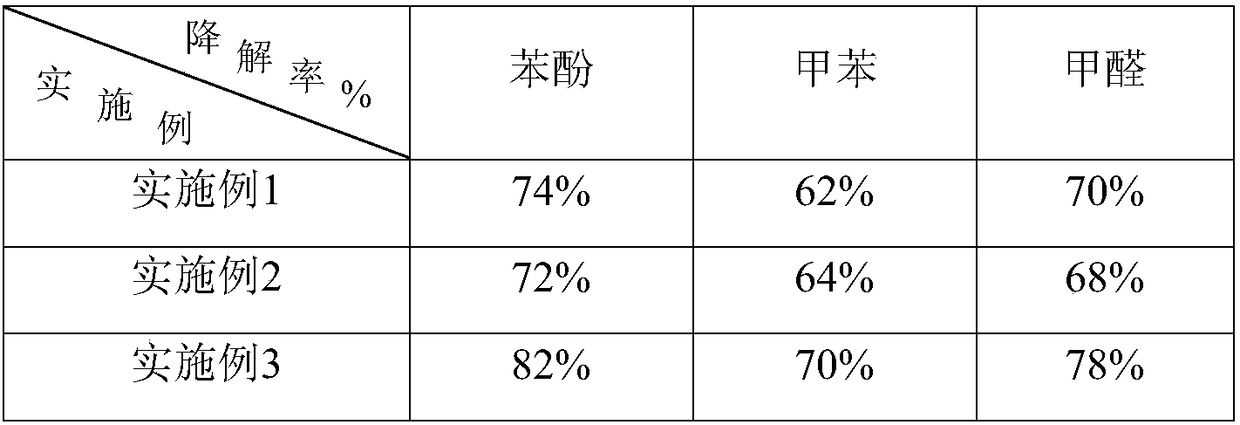Preparation method of functional wood capable of photocatalytically degrading organic pollutants
A technology of organic pollutants and photocatalysis, applied in the field of photocatalytic materials, can solve the problems of loss of nanometer effect, reduction of specific surface area, easy aggregation of nanoparticles, etc., and achieve the effect of strong catalytic degradation ability and good degradation effect.
- Summary
- Abstract
- Description
- Claims
- Application Information
AI Technical Summary
Problems solved by technology
Method used
Image
Examples
Embodiment 1
[0032] An embodiment of the preparation method of the functional wood that can photocatalytically degrade organic pollutants of the present invention, the preparation method of the functional wood comprises the following steps:
[0033] (1) The sawn poplar (length, height and width are respectively: 100mm × 10mm × 100mm) was ultrasonically treated at a power of 600W in 5% potassium hydroxide solution for 6 hours to get through the pores inside the wood and The hydroxyl groups on the wood surface were exposed, rinsed with deionized water after sonication, and the wood was dried under vacuum.
[0034](2) Weigh 0.01mol of Bi(NO 3 ) 3 .5H 2 O was dissolved in 100 ml of glacial acetic acid solution with a mass fraction of 10%, vinyltris(methoxyethoxy)silane coupling agent was added, and the mixture was stirred thoroughly at room temperature to obtain a mixed solution. Wherein, the addition amount of the vinyl tris(methoxyethoxy)silane coupling agent is 1% of the mass of the mixe...
Embodiment 2
[0040] An embodiment of the preparation method of the functional wood that can photocatalytically degrade organic pollutants of the present invention, the preparation method of the functional wood comprises the following steps:
[0041] (1) Treat the sawn poplar wood (length, height and width: 150mm×120mm×150mm) under 15kW microwave for 50s to open the pores inside the wood and expose the hydroxyl groups on the surface of the wood, and then The microwave-treated wood was sawn and cut into 100mm×10mm×100mm test pieces for later use.
[0042] (2) Weigh 0.01mol of Bi(NO 3 ) 3 .5H 2 O was dissolved in 100 ml of glacial acetic acid solution with a mass fraction of 10%, vinyltrimethoxysilane coupling agent was added, and the mixture was stirred thoroughly at room temperature to obtain a mixed solution. Wherein, the addition amount of the vinyltrimethoxysilane coupling agent is 1% of the mass of the mixed solution.
[0043] (3) Weigh 0.004 mol of KI and 0.006 mol of KCl and disso...
Embodiment 3
[0048] An embodiment of the preparation method of the functional wood that can photocatalytically degrade organic pollutants of the present invention, the preparation method of the functional wood comprises the following steps:
[0049] An embodiment of the preparation method of the functional wood that can photocatalytically degrade organic pollutants of the present invention, the preparation method of the functional wood comprises the following steps:
[0050] (1) Treat the sawn poplar wood (length, height and width: 150mm×120mm×150mm) under 20kW microwave for 40s to open the pores inside the wood and expose the hydroxyl groups on the surface of the wood, and then The microwave-treated wood was sawn and cut into 100mm×10mm×100mm test pieces for later use.
[0051] (2) Weigh 0.02mol of Bi(NO 3 ) 3 .5H 2 O was dissolved in 100 ml of glacial acetic acid solution with a mass fraction of 10%, vinyltriethoxysilane coupling agent was added, and the mixture was stirred thoroughly...
PUM
 Login to View More
Login to View More Abstract
Description
Claims
Application Information
 Login to View More
Login to View More - R&D
- Intellectual Property
- Life Sciences
- Materials
- Tech Scout
- Unparalleled Data Quality
- Higher Quality Content
- 60% Fewer Hallucinations
Browse by: Latest US Patents, China's latest patents, Technical Efficacy Thesaurus, Application Domain, Technology Topic, Popular Technical Reports.
© 2025 PatSnap. All rights reserved.Legal|Privacy policy|Modern Slavery Act Transparency Statement|Sitemap|About US| Contact US: help@patsnap.com

